BMW iX1 vs Jeep Avenger – Which model is better for everyday use?
Compare performance, boot capacity, efficiency and price at a glance.
Find out which car is the better choice for you – BMW iX1 or Jeep Avenger?
Costs and Efficiency:
Price and efficiency are often the first things buyers look at. Here it becomes clear which model has the long-term edge – whether at the pump, the plug, or in purchase price.
Jeep Avenger has a clearly advantage in terms of price – it starts at 21900 £, while the BMW iX1 costs 41800 £. That’s a price difference of around 19886 £.
In terms of energy consumption, the advantage goes to the Jeep Avenger: with 15.50 kWh per 100 km, it’s barely noticeable more efficient than the BMW iX1 with 15.80 kWh. That’s a difference of about 0.30 kWh.
As for range, the BMW iX1 performs to a small extent better – achieving up to 463 km, about 63 km more than the Jeep Avenger.
Engine and Performance:
Power, torque and acceleration say a lot about how a car feels on the road. This is where you see which model delivers more driving dynamics.
When it comes to engine power, the BMW iX1 has a clearly edge – offering 313 HP compared to 156 HP. That’s roughly 157 HP more horsepower.
In acceleration from 0 to 100 km/h, the BMW iX1 is convincingly quicker – completing the sprint in 5.60 s, while the Jeep Avenger takes 9 s. That’s about 3.40 s faster.
In terms of top speed, the Jeep Avenger performs slight better – reaching 194 km/h, while the BMW iX1 tops out at 180 km/h. The difference is around 14 km/h.
There’s also a difference in torque: BMW iX1 pulls convincingly stronger with 494 Nm compared to 260 Nm. That’s about 234 Nm difference.
Space and Everyday Use:
Whether family car or daily driver – which one offers more room, flexibility and comfort?
Both vehicles offer seating for 5 people.
In curb weight, Jeep Avenger is decisively lighter – 1180 kg compared to 1940 kg. The difference is around 760 kg.
In terms of boot space, the BMW iX1 offers evident more room – 490 L compared to 380 L. That’s a difference of about 110 L.
In maximum load capacity, the BMW iX1 performs a bit better – up to 1495 L, which is about 218 L more than the Jeep Avenger.
When it comes to payload, Jeep Avenger slight takes the win – 502 kg compared to 495 kg. That’s a difference of about 7 kg.
Who comes out on top?
Overall, the BMW iX1 shows itself to be dominates this comparison and secures the title of DriveDuel Champion.
It convinces with the more balanced overall package and proves to be the more versatile choice for everyday use.
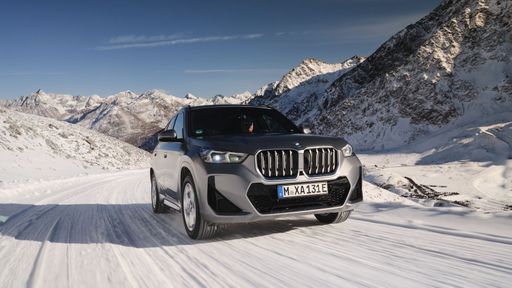 @ BMW Group Press
@ BMW Group Press
BMW iX1
BMW iX1
The BMW iX1 wraps BMW's electric ambition into a compact SUV package that feels unexpectedly premium, with sharp handling and a crisp, modern cabin that keeps the driver in charge. It's ideal for buyers who want a stylish, quiet daily driver with useful practicality and tech-savvy touches — plus enough character to make the commute feel less like a chore and more like a short joyride.
details @ BMW Group Press
@ BMW Group Press
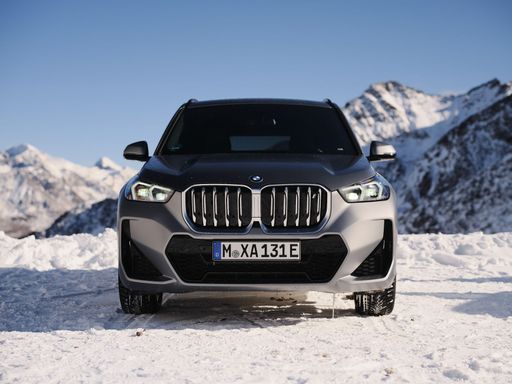 @ BMW Group Press
@ BMW Group Press
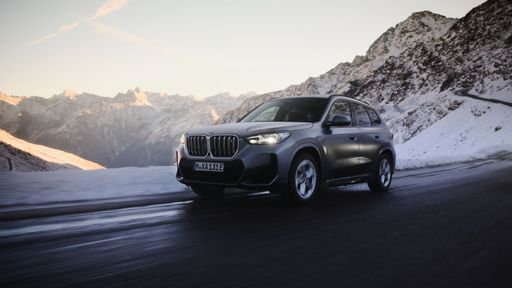 @ BMW Group Press
@ BMW Group Press
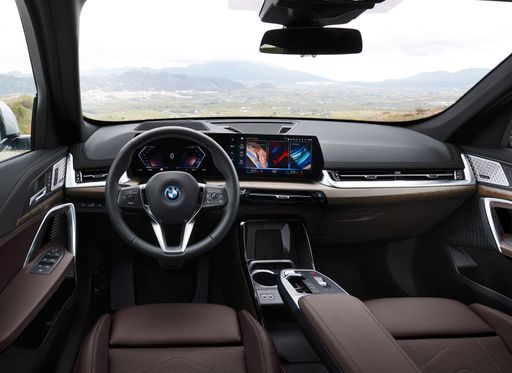 @ BMW Group Press
@ BMW Group Press
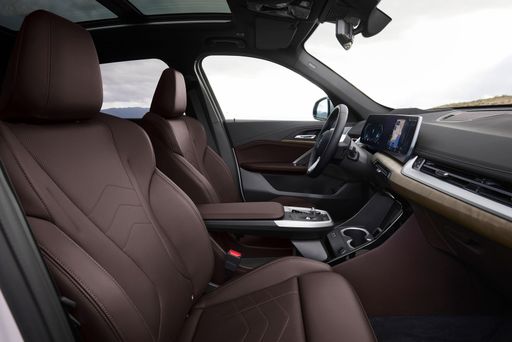 @ BMW Group Press
@ BMW Group Press
Jeep Avenger
The Jeep Avenger shrinks Jeep's boxy, adventurous styling into a city-friendly electric crossover that looks just as at home on tight streets as it does on muddy weekend lanes. It's a savvy pick for drivers who want go-anywhere attitude without the truck-size ego — practical inside, lively around town and ready to tackle a bit of rough stuff when the mood strikes.
details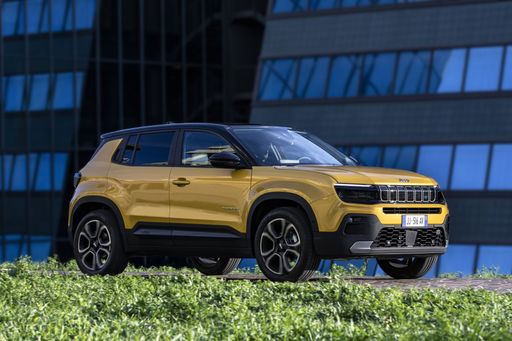 @ Jeep / Stellantis Media
@ Jeep / Stellantis Media
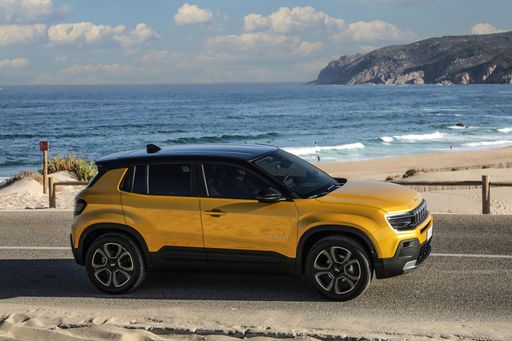 @ Jeep / Stellantis Media
@ Jeep / Stellantis Media
 @ Jeep / Stellantis Media
@ Jeep / Stellantis Media
 @ Jeep / Stellantis Media
@ Jeep / Stellantis Media
 @ Jeep / Stellantis Media
@ Jeep / Stellantis Media
 @ BMW Group Press
@ BMW Group Press
|
 @ Jeep / Stellantis Media
@ Jeep / Stellantis Media
|
|
|
|
Costs and Consumption |
|
|---|---|
|
Price
41800 - 54600 £
|
Price
21900 - 36900 £
|
|
Consumption L/100km
-
|
Consumption L/100km
4.9 - 5.7 L
|
|
Consumption kWh/100km
15.8 - 17.1 kWh
|
Consumption kWh/100km
15.50 kWh
|
|
Electric Range
436 - 463 km
|
Electric Range
400 km
|
|
Battery Capacity
64.80 kWh
|
Battery Capacity
51 kWh
|
|
co2
0 g/km
|
co2
0 - 129 g/km
|
|
Fuel tank capacity
-
|
Fuel tank capacity
44 L
|
Dimensions and Body |
|
|---|---|
|
Body Type
SUV
|
Body Type
SUV
|
|
Seats
5
|
Seats
5
|
|
Doors
5
|
Doors
5
|
|
Curb weight
1940 - 2085 kg
|
Curb weight
1180 - 1520 kg
|
|
Trunk capacity
490 L
|
Trunk capacity
325 - 380 L
|
|
Length
4500 mm
|
Length
4084 - 4088 mm
|
|
Width
1845 mm
|
Width
1776 mm
|
|
Height
1616 mm
|
Height
1527 - 1541 mm
|
|
Max trunk capacity
1495 L
|
Max trunk capacity
1218 - 1277 L
|
|
Payload
495 kg
|
Payload
494 - 502 kg
|
Engine and Performance |
|
|---|---|
|
Engine Type
Electric
|
Engine Type
Electric, Petrol, Petrol MHEV
|
|
Transmission
Automatic
|
Transmission
Automatic, Manuel
|
|
Transmission Detail
Reduction Gearbox
|
Transmission Detail
Reduction Gearbox, Manual Gearbox, Dual-Clutch Automatic
|
|
Drive Type
Front-Wheel Drive, All-Wheel Drive
|
Drive Type
Front-Wheel Drive, All-Wheel Drive
|
|
Power HP
204 - 313 HP
|
Power HP
100 - 156 HP
|
|
Acceleration 0-100km/h
5.6 - 8.6 s
|
Acceleration 0-100km/h
9 - 10.6 s
|
|
Max Speed
170 - 180 km/h
|
Max Speed
150 - 194 km/h
|
|
Torque
250 - 494 Nm
|
Torque
205 - 260 Nm
|
|
Number of Cylinders
-
|
Number of Cylinders
3
|
|
Power kW
150 - 230 kW
|
Power kW
74 - 115 kW
|
|
Engine capacity
-
|
Engine capacity
1199 cm3
|
General |
|
|---|---|
|
Model Year
2022 - 2023
|
Model Year
2023 - 2025
|
|
CO2 Efficiency Class
A
|
CO2 Efficiency Class
A, D, C
|
|
Brand
BMW
|
Brand
Jeep
|
Is the BMW iX1 offered with different drivetrains?
The BMW iX1 is available as Front-Wheel Drive or All-Wheel Drive.
The prices and data displayed are estimates based on German list prices and may vary by country. This information is not legally binding.
